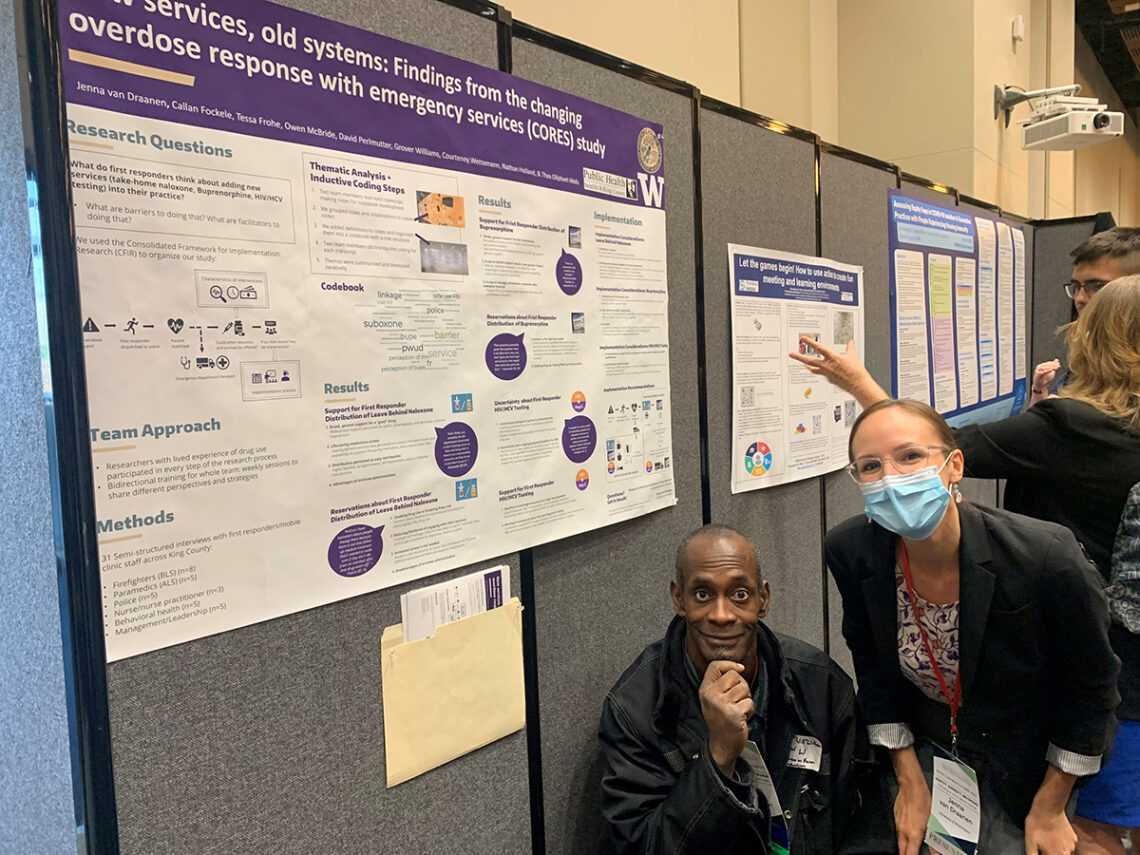Opioid use research
Helping WA first responders in the fight against opioid overdose
University of Washington School of Nursing Assistant Professor Jenna van Draanen, PhD, MPH, has led several research studies to better understand opioid use from the perspective of both first responders and people who have experienced an overdose.
 READU team presenting results of EMS research
READU team presenting results of EMS research
Oct. 5, 2023 — Drug overdose and opioid use is a serious public health crisis in the United States. According to the Washington State Department of Health (WSDH), drug overdose deaths from the use of heroin, prescription opioids, and synthetic opioids such as fentanyl, have sharply risen nationwide since 1999.
“The amount of opioids prescribed and sold in the United States nearly quadrupled from 1999 to 2014, but there was not an overall change in the amount of pain that Americans report,” states the WSDH website.
Washington state has seen similar trends.
Emergency Medical Services (EMS) researcher Jenna van Draanen, PhD, MPH, who is jointly appointed in the University of Washington School of Public Health and the School of Nursing, and holds a position at Public Health Seattle, King County, has led several research studies to better understand opioid use from the perspective of both first responders and people who have experienced an overdose.
“First responders are doing extremely hard work,” said van Draanen. “They are sometimes reversing an overdose on the same people multiple times, and the people they treat often don’t accept transport to the emergency department because they experience stigma and little to no help when they get there.”
First responders are in a challenging moment addressing the problem.
In 2021, van Draanen received a Research Intramural Funding Program (RIFP) grant, supported by the Troop Research Fund, from the UW School of Nursing to conduct a pilot study. The goal was to interview first responders and find out what their experiences were with responding to overdose situations, and secondarily to help develop training for first responders.
“Our interviews revealed frustration and desire to solve a problem that can’t be solved without broader systems change,” said van Draanen. “First responders experience a dual problem, feeling both overwhelmed by the increased workload and helplessness because of the lack of acceptable and available care options beyond the emergency department for people post-overdose.”
Her research revealed that there is a significant need for first responders to have practical skills and tools to address opioid overdoses in the field. Responders also shared the desire for training, especially training offered by those with authority and experience on the topic.
The research was done in collaboration with her team of community co-researchers called READU (Research with Expert Advisors on Drug Use). The group includes five community members who have lived and living experience of drug use and who want to do EMS related research.
“We do bidirectional training, so we trained our community co-researchers in data collection and data analysis,” shared van Draanen. “They’ve trained us, too, and taught us about what it’s like to experience a first responder call and what the scene is like in Seattle right now.”
van Draanen received additional funding from an Implementation Science Grant through the UW School of Public Health. She investigates barriers and facilitators to implementation for some tangible interventions, like administering field-initiated buprenorphine to help people with opioid use disorder and having firefighters and EMTs distribute take-home Naloxone, a nasal spray that is easy to administer and rapidly reverses an overdose, to a widespread population.
van Draanen’s partners Public Health, Seattle King County, which runs the EMS division for King County and is also invested in opioid prevention and evidence-based response, are looking to implement some of these training and intervention recommendations.
“Over the next four years, there is potential for a lot of system changes,” said van Draanen. “Things like offering more training for EMS teams, distributing field-initiated buprenorphine take-home Naloxone, and dispatching specialized overdose response units, are all possibilities.”
Recently, van Draanen found out she got an R01 grant from the National Institute of Drug Abuse. She’ll receive close to $4 million over five years to test whether or not the EMS interventions have a population-level impact, among other things.
“We’re going to create an overdose survivor’s cohort and follow them over time,” said van Draanen. “There will be a qualitative component and ultimately the grant will help us understand the impact of EMS interventions on racial disparities in overdose outcomes.”
van Draanen hopes that her research findings will be rolled out locally at a large scale and then shared nationally.
“People are constantly looking to the first responder system in our region,” said van Draanen. “Our paramedic system in King County is among one of the best in the nation.”
van Draanen’s research has already made an essential contribution to the fight against opioid overdose. Her work has helped to reduce the stigma surrounding opioid overdose, provide first responders with the necessary training and tools, and create a safer and more supportive environment for people who use drugs.
“I feel so grateful and so lucky to be doing this work.” said van Draanen. “I love that I get to work closely with people who are making change in real time and in different ways in their communities.”
– Jennifer Hunt
